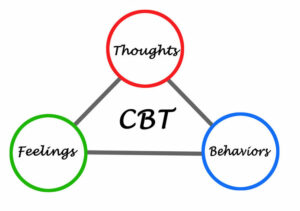Stress can be a debilitating force in our lives. Everyone experiences stress, but some of us experience it in more significant ways than others. The good news is that there are ways to reduce and manage stress. One such way is Cognitive Behavioral Therapy (CBT). Cognitive Behavioral Therapy (CBT) is a type of psychotherapy used by professionals to help people. In this blog post, we’ll discuss the basics of CBT for stress, different techniques used by therapists, how it works, and more.
Contents
What is CBT?

Cognitive behavioral therapy (CBT) is a type of psychotherapy that helps people change their thinking and behavior. CBT is based on the idea that our thoughts, feelings, and behaviors are all connected. So, if we want to change our behavior, we need to change our thoughts and feelings.
CBT is a short-term therapy, which means it usually lasts for 12 weeks or less. During CBT, you will work with your therapist to identify your thoughts and behaviors that are contributing to your stress. You will then learn how to change these thoughts and behaviors.
CBT is an effective treatment for stress because it helps you to identify and change the thinking and behavior patterns that are causing you stress. If you are looking for a way to reduce your stress levels, CBT may be a good option for you.
How Does CBT Work for Stress?
The working of CBT for stress is based on the premise that our thoughts and beliefs influence how we feel and how we handle situations. It works by helping people identify, challenge and modify irrational thoughts or beliefs that are causing them to react in a certain way when faced with a stressful situation.
CBT helps you to recognize any unhelpful patterns of thinking and behavior that contribute to your stress and teaches you new strategies to cope with stressful situations.
By challenging negative beliefs and thoughts, CBT works to break the cycle of distress, improve well-being, and provide individuals with healthier ways of dealing with stress. It can also help people become more aware of the connections between their thoughts, feelings, and behaviors and how they can be changed.
CBT can also help individuals become better problem-solvers, encouraging them to focus on solutions rather than problems when faced with a stressful situation.
It teaches people that their reactions are not always the only option available to them and encourages them to think of alternative solutions or ways of dealing with the same issue. The ultimate aim of CBT is to help people create a toolbox of coping strategies that they can continue to use in their everyday lives.
Different Techniques Used in CBT

There are many types and techniques of CBT for stress that can be employed. Some of the most common are:
Cognitive Restructuring
This technique teaches people to recognize and identify irrational thoughts, beliefs, and attitudes about themselves and their environment. It helps them replace these negative thoughts with more rational beliefs that help reduce anxiety or depression caused by stress. This helps people to view situations more objectively, leading to better decision-making.
Exposure Therapy
This type of CBT involves exposing individuals to the source of their stress or anxiety in a safe and controlled environment. Through repeated experiences with the situation, they learn effective coping strategies to deal with it. This technique is especially useful for people who have an intense fear of a particular situation or object that consistently triggers their stress.
Mindfulness Meditation
This type of meditation is used to help individuals become more aware and in tune with their bodies, mind, and environment. People learn to accept and observe their thoughts, feelings, and sensations without judgment or criticism. This helps them to be better equipped to manage and address their stress calmly and effectively.
Relaxation Techniques
These techniques help to reduce physical tension, allowing individuals to feel more relaxed and at ease. Examples include deep breathing, progressive muscle relaxation, mindfulness meditation, guided imagery, yoga, and tai chi. These activities promote better emotional regulation as well as help individuals gain control over their thoughts and feelings.
Problem-Solving
Another technique that can surely help to reduce stress is problem-solving. This technique helps individuals identify the source of their stress and find ways to manage it. Through careful analysis, they can break down the issue into smaller parts and come up with concrete solutions to address them. Problem-solving provides individuals with a sense of control over their lives and their ability to tackle challenging situations.
Pros and Cons of CBT

Everything has an upside and a downside, including Cognitive Behavioral Therapy (CBT). While CBT has a lot of potentials to help you manage stress, there are also some possible drawbacks to consider.
Pros:
- CBT is based on the idea that our thoughts affect our behavior and emotions. By identifying potentially negative thought patterns and working to reframe them in healthier ways, CBT can help us learn how to better manage our stress.
- CBT is widely available, as it can be done with the help of a therapist or through self-help books and online resources.
- It’s also relatively short-term, meaning that it doesn’t require a lifelong commitment to therapy. This makes it more accessible to those who may not have the resources or time for years of therapy.
Cons:
- CBT can be uncomfortable, as it requires looking inward and facing our thought patterns head-on. It’s also challenging work and requires dedication to see real results.
- CBT is not a “cure-all” and should be used as part of an overall strategy to manage stress. It may not work for everyone and it is important to understand the limitations of CBT before beginning treatment.
- Finally, because CBT requires active participation and thought, it can be difficult to stay motivated when practicing on your own. Working with a therapist can be helpful in this regard, but it may not be feasible for everyone.
Overall, CBT is a powerful tool that can help us manage stress and improve our mental health. It has the potential to make lasting changes, but it’s important to be aware of the possible pros and cons.
How to Find a CBT Therapist?
Finding a qualified cognitive behavioral therapist (CBT) is essential to experiencing the full benefits of CBT.
These are some of the sources to find a CBT therapist:
- Ask your primary care doctor for a referral. Your doctor likely has relationships with mental health professionals and can provide recommendations based on your needs.
- Ask friends, family members, or colleagues who have had successful therapy experiences for referrals. While not always reliable, word of mouth is often the best way to get a referral.
- Search online directories of CBT therapists in your area. There are numerous online directories where you can search for a therapist by location, specialty, and more.
- Use an app to find a therapist. Many apps provide listings of therapists in your area, allowing you to review profiles, read reviews and connect with the right therapist for you. MantraCare is such an app.
Conclusion
In conclusion, cognitive behavioral therapy (CBT) is a powerful tool that can be used to help manage stress. By examining the thought patterns and behaviors associated with stress, CBT practitioners can identify and address the negative cycle of thinking and behavior. Additionally, clients learn practical skills for managing their reactions and emotions to reduce or eliminate sources of distress. With commitment and practice, CBT can serve as an effective technique for long-term reduction in stress levels.
For more information, please contact MantraCare. Stress can have both physical and mental effects on the body, leading to negative consequences such as anxiety, depression, and even physical illnesses. If you have any queries regarding Online Stress Counseling experienced therapists at MantraCare can help: Book a trial Stress therapy session


